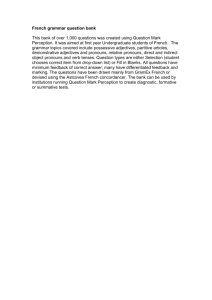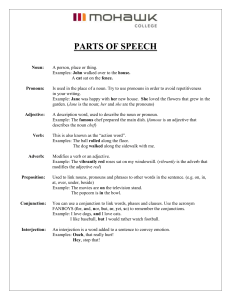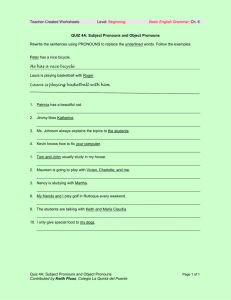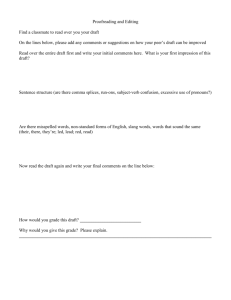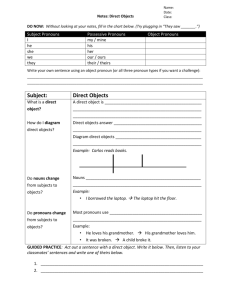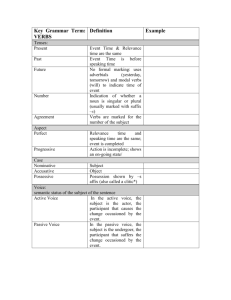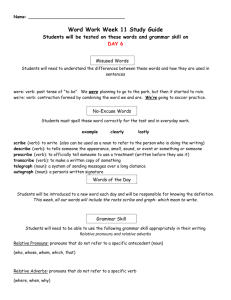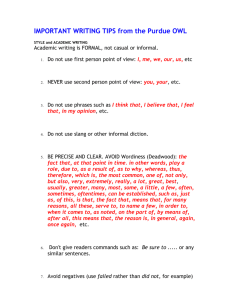Grammar Lessons 49-53
advertisement
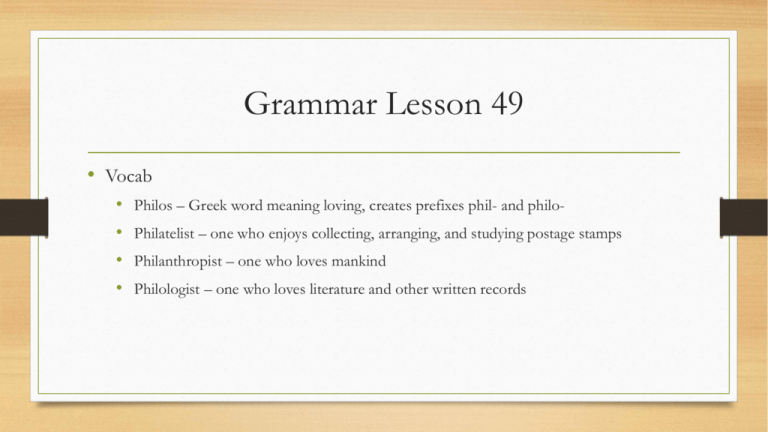
Grammar Lesson 49 • Vocab • Philos – Greek word meaning loving, creates prefixes phil- and philo- • Philatelist – one who enjoys collecting, arranging, and studying postage stamps • Philanthropist – one who loves mankind • Philologist – one who loves literature and other written records Pronouns and Antecedents • Pronouns take the place of a noun or noun phrase • Pronouns help us avoid using the same noun repeatedly • He, she, it, we, they, etc. are words we use to refer to people, places, and things we’ve already mentioned • The noun or noun phrase a pronoun replaces is the antecedent Grammar Lesson 50 • Vocab • Antagonist – person or thing fighting against the hero of a story • Protagonist – the hero of the story • Melodrama – exaggerated drama intended to evoke strong feeling, e.g. soap operas • Foreshadowing – hinting of what is going to happen in the story The Comma, Part 3: • • • • Greetings and closings of letters require commas When we alphabetize by last name, we place a comma after the last name Commas equal a pause Introductory elements begin a sentence and require a comma after. • However, we don’t always use introductory elements. • Interrupting elements interrupt the sentence and need to be offset with commas • I, on the other hand, never interrupt my own sentences. • Afterthoughts are also offset by commas • He is very talented, isn’t he? Grammar Lesson 51 • Vocab • Gonia – Greek noun meaning angle, gives suffix –gon • Pentagon – closed plane figure with five sides and five angles • Hexagon – six sides and six angles • Octagon – eight sides and eight angles • Polygons – closed plane figures with three or more sides Personal Pronouns • Five categories of pronouns: personal, relative, indefinite, interrogative, and demonstrative • Personal pronouns refer to people and things • Three forms of personal pronouns: person, number, and case • Person – first, second, or third person • Number – personal pronouns are singular – I, me, you, he, etc. or plural – we, us you, them • Case – shows the pronouns job in the sentence Grammar 52 Vocab • Caricature – description or drawing that ridiculously exaggerates the characteristics or striking features of a person or thing • Allegory – story in which characters and events represent an underlying truth about life • Cliché – trite expression used so often that it isn’t an effective way to say something • Denouement refers to resolution of the story or plot Irregular Verbs, Part 2 • • • • • See chart in book p. 301 Irregular verbs don’t form past tense by adding a d or ed There are no rules for forming the past tense and past participles We recognize most, but must memorize the ones we don’t know already Be careful not to confuse the past tense and the past participle Grammar 53 Vocab • Anthropos – Greek noun meaning man, human being, serves as prefix anthropo- in English • Anthropomorphous – having or resembling human form • Anthropogenesis – study of the human race and its beginnings • Anthropometry – size and measurements of a human being Nominative Pronoun Case • Pronouns have three cases: nominative, objective, and possessive • Pronouns are in the nominative case when they are used as a subject or predicate nominative • Complete the chart on p. 307-8
